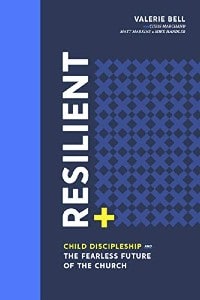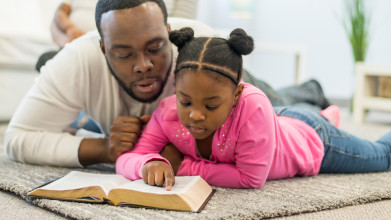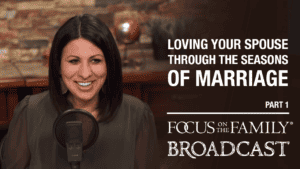John Fuller: Imagine this scene, uh, there’s a young teenage boy standing by the flagpole of his school, but he’s utterly alone. Hayden thought his friends would join him for a public prayer event, but no one else showed up. Am I alone? Really? Where is everyone? But instead of walking away defeated, Hayden prayed, asking God to use this embarrassing moment to help him reach others for Christ. Well, today on Focus on the Family, we’re going to hear how your son or daughter can become more like a Hayden, a real-life witness for Jesus. Your host is Focus president and author, Jim Daly. I’m John Fuller.
Jim Daly: Uh, John, one of the most challenging issues Christian parents contact us about is discipleship of their own children. Many moms and dads don’t feel qualified to share their faith effectively. I know for Jean and I, that at times was true. Um, just getting their attention when they’re four or five, six years old (laughs)-
John: Hmm.
Jim: … can be a challenge. And maybe you’re afraid of messing up the gospel and leading your child astray, who knows what the, uh, the issues are. Discipleship was never modeled for you growing up. That could be an issue that was certainly Jean and I. We didn’t come from Christian homes. Uh, or you might think the church and Sunday school should be enough to teach your kids that one day a week, right? But it’s not. Today we’re going to address those concerns and challenge you frankly, to take on this responsibility because there is no more effective witness to your children than you, mom and dad. And that’s why Deuteronomy 6, tells us to diligently teach God’s word to our children when we’re at home, when we’re walking along and throughout the day. And the good news is you’re not alone in the process. There are many organizations that can help you move that forward.
John: And we kind of had a privilege to do that, uh, through a number of ways. One way is, uh, bring your Bible to school day, that’s every year in October that, uh, we promote and we anticipate really hundreds of thousands of students from grade school through college age, really celebrating and commemorating, bring your Bible to school day that’s tomorrow, October 7th. And then of course, Jim, we have our livid challenges for families where you can kind of do a deep dive into God’s word and learn to apply principles, kind of walk-through day by day with your kids. Learn more about the livid challenges at our website. The link is at focusonthefamily.com/broadcast.
Jim: And John, we have some great guests today who will help us explore the topic of child discipleship. Uh, they are the leaders of a well-known church-based ministry called Awana, which provides evangelism discipleship to children between the ages of two and 18. That’s quite a (laughs) quite a broad band. Valerie Bell is the CEO and Matt Markins is the president of Awana and together they’ve written a book called Resilient: Child Discipleship and the Fearless Future of the Church. Great title, Valerie, Matt, welcome to Focus.
Valerie Bell: Thank you. It’s great to be here.
Matt Markins: It’s great to be with you.
Jim: Yeah, well, let’s get into it. Going back to the opening story. We share that John shared about Hayden, the boy standing alone at the flagpole. Uh, you identify him as a resilient disciple, uh, for Christ. Uh, define what you mean by resilient in that context.
Valerie: Well, resilient is a quality that allows a person to bend and flex, but not break under culture. And so, uh, a less resilient Christian kid would have walked right out of there. I think I would have walked right out of there-
Jim: Yeah. Would have been tough.
Valerie: … when I was age. That was embarrassing.
Jim: How old was he?
Valerie: Uh, 15, I think-
Jim: Okay. Yeah. That’s tough.
Valerie: … he was at that time.
Jim: Peer pressure.
Valerie: Yeah, absolutely.
Jim: Wow!
Valerie: So that picture of this child who is, um, a believer there’s, that’s the discipleship part, but because of so many things that are happening, you, you address parents at the beginning, they are feeling this, uh, mightily, the secularization of our culture and the pool that it has on our kids. So besides discipleship, we’ve added this, uh, culturally aware word, which is resilient, resilient discipleship. And the other interesting part of this that I want to point out is that the bending and flexing indicates that they are engaged in the culture. So they are not protected to the point that they don’t have to deal with these issues.
Jim: Yeah.
Valerie: They are out in it. And we are really so interested-
Jim: Yeah.
Valerie: … and so passionate about teaching this generation of kids, how to engage the culture better than we ever have done.
John: Mm-hmm.
Jim: Um, you point to the story of Dr. West Stafford. He’s a friend of mine, a former CEO of, uh, Compassion International and, and what a wonderful person. Um, you know, I’ve heard him speak many times. He’s done chapel here at Focus for the staff, but just that, that sense of humility. And, uh, and he had very difficult, uh, upbringing. Uh, how did his story grab your heart?
Valerie: Well, uh, West is, uh, a gift to the church. Uh, he and I were in college together. We go way back (laughs).
Jim: Oh, yeah.
Valerie: And, uh, so I’ve watched this and wished that I could have given him a different childhood. He was broken in his childhood, uh, in a missionary home for kids, a school where there was a lot of abuse of all different kinds that went on.
Jim: Mm-hmm.
Valerie: Uh, but what has been fascinating to watch is right at the place where he was broken, God grew him strong. And so he’s able to minister to children all over the world with an understanding of the difficulties that they face. And so, you know, that redemptive work of God too. And I, and I think your story’s a little bit like that too, Jim-
Jim: Mm-hmm. Mm-hmm.
Valerie: Uh, I, I don’t know if all your listeners know this, but I read as a guest on your broadcast about your childhood. That was tough. That was really, really tough. But look how creative God is. Uh, we say, God is in the messes. He’s most creative at the places where we are not able to help ourselves. And, um, so with both you and Wes, you know, God had a plan for you to minister, to kids all over the world basically.
Jim: Yeah.
Valerie: Out of your [inaudible].
Jim: And I think in that regard, I mean, that’s one of the more difficult questions I’ll get after I speak. And, you know, people will come up and they’ll ask me, you know, I, I had a childhood, like it was a… but how did you choose to let those things go? I have not been able to do that. It’s a really difficult question.
Valerie: Hmm.
Jim: And, uh, you know, you just have to choose to forgive and, and let go. In fact, you’ve identified three B’s for helping our kids become more resilient in their faith, belong believe and become, uh, share what those B’s are and what they mean.
Matt: Yeah. So the key there is when all three B’s are present, belong, believe, become, a child’s likelihood of becoming and have an identity that’s formed in Christ as much higher. So-
Jim: When you… let me interrupt quickly before you go on with that. Because today I think that’s one of the critical crises in the, in the culture of young people, where do I plant my identity?
Matt: Yeah.
Jim: And we’re seeing it-
Valerie: Yes.
Jim: …. all over the, the place, right? Um, with all of the interest groups that have emerged, but in that context, continue, sorry, but this is critical-
Matt: Yeah.
Jim: … for your young person, your child, to know what their identity is.
Valerie: And we should get back to that. Let’s not draw that.
Matt: What does every one of our listeners want, when we think about our kids and grandkids, we, we lift our eyes to the future, our hopes and our dreams. We want an adult who’s thriving in their life and in their faith-
Jim: Serving God.
Matt: Absolutely. So these three B’s belong, which is highly relational ministry led by loving, caring adults. That’s not only you as the parent or the grandparent or guardian, but that’s the commu- larger church community or faith. The belief that’s deeply scriptural ministry rooted in the truth of God’s word and the power of the gospel and become that’s highly experiential ministry. That’s getting kids out of a simulation world and getting them into real faith building experiences. So again, the secret sauce there is when all three are present, their likelihood of being an ide- having an identity of a resilient disciples, much higher. So if I’m a parent I’m evaluating, hey, are these happening in the life of my child?
John: Hmm.
Jim: Yeah.
Valerie: So, uh, you brought up the word identity, but those three B’s develop identity in Christ. And, uh, listen to this though. This will give you a sense of where our culture is.
Jim: Hmm.
Valerie: Okay. So these are common phrases we hear all the time, love yourself. You be you, uh, my body, my choice. Follow your head, your heart.
Matt: Good vibes tribe.
Valerie: Yeah. Uh, go ahead. You know what I mean.
Matt: (laughs)
Valerie: Believe in yourself. That is the culture of individualism and the rise of me-
Jim: Yeah.
Valerie: … me. And so, uh, this is a belief system that does not bow to any previous religion. It does not bow to anything other than the self.
Jim: You know, something that came out just a while back, uh, an article, I think it was titled Fake Christianity.
Matt: Mm-hmm.
Jim: And the premise was just that, that the church has lost its way because it’s more about self-improvement and feeling good about yourself than it is about service and our attitude toward the Lord and toward the world around us. Have you had time to process that, that crisis that we’re seeing in the church?
Valerie: Absolutely. And, uh, I think that we’re a little bit of culture vultures. Uh, we have a 70 plus year ministry that we began to examine very closely. We knew we could not just drift on into the future.
Jim: Yeah.
Valerie: And so, you know, that required us to be aware of, uh, not only Awanas culture, but the church culture and the secular culture. So th- this might interest you as well as talk about Christian Smith.
Matt: I was working two days apart.
Valerie: Yeah. This is worth bringing up at this point ’cause I think it really-
Matt: Sure.
Valerie: … fits in here. Moralistic therapeutic deism.
Jim: Right. That was part of the article.
Matt: Yeah.
Valerie: It was? Okay. So he did this survey of a broad scope it’s so it was some church kids, some secular kids. He found, they basically all believed the same thing. And it was this moralistic therapeutic deism. There is, uh, five tenets. God created the world. He cares about the world. The second is that, um, he wants us to be kind to each other and help each other. The third is the main goal of your life is to be happy. The fourth is God will help you if you’re in trouble, but otherwise he probably won’t mess with you too much. And the fifth is that good people go to heaven.
Jim: Yeah. What a thing.
Valerie: Isn’t that fascinating?
Jim: Yeah it is. It is.
Valerie: What do you find fascinating about it?
Jim: Well, I think that the emphasis on being happy.
Matt: Yeah.
Valerie: Yes.
Jim: I mean, because if, if you make that your objective, your circumstances dictate your emotional response to God. Being an orphan kid, that is not a good place to be.
Valerie: Yeah.
Jim: So you’ve got to trust in the Lord, regardless of your circumstances, you need to love the Lord.
Valerie: Yes.
Jim: You need to love the path that he has you on.
Valerie: Yes.
Jim: Regardless of your circumstances. That’s what the scripture teaches.
Valerie: What’s missing anyway.
Matt: Well, so all of that you just described, Valerie is describing a worldview that’s forming an identity around hyper individualization … compare that with the three B’s, which is a philosophy to form the identity of a, of a disciple in Jesus Christ.
Jim: But, you know, let’s bring this to some other data that’s come out where parents are aware of the troubling statistics, where Christian families, a high percentage of young people are walking away from the faith. And I, I would think that partly this is emerging in order to keep some stickiness for the kids.
Valerie: Mm-hmm.
Jim: Right. Which I don’t think is the right thing.
Valerie: Mm-hmm.
Jim: But, um, you know, it’s an attempt, I believe to help young people not abandon the faith altogether.
Valerie: Yes.
Jim: So you end up with that-
Valerie: So-
Jim: … therapeutic deism.
Valerie: Yes. Uh, you know, and that sounds very, uh, Christian in a way, except there’s no Jesus, there’s no slant-
Jim: Right.
Valerie: … and there’s no need for gro- for God, except when you’re in trouble. There’s not this relationship. It’s such a delight to be someone who follows Christ and he has this, um, enormous, uh, spiritual, uh, life happening inside.
Jim: Well, and you going back to Hayden and the first example we used with the flagpole, and he was the only kid that showed up and, you know, you decided to just keep moving forward and pray. You mentioned your book, that what children need is spine and heart-
Valerie: (laughs)
Jim: … which I love. It sounds more like a football huddle. No guys, we need some spine here. We need some heart.
Valerie: Yeah.
Jim: Describe what you’re describing-
Matt: Well it goes back to that preparation versus protection. Valerie, talk about it.
Valerie: Well, you know, I think having just come through an enormous learning experience in our last election where we did not know how to talk to our culture very well, we just attacked them and we attacked each other as well. Uh, we need to learn how to engage properly. So s- uh, spine says, know what you believe, but go across the bridge of heart when you’re going to talk to somebody about what you believe in. So I’m still trying to learn this because, you know, I want to like go right for the issue. But, um, I, after the Super Bowl, uh, oh, the, you know, when Jennifer-
Jim: It’s two years ago I believe.
Valerie: … two years ago, that that just lit up the testosterone on social media with Jennifer, uh-
John: Right. Jennifer Lopez and Shakira.
Matt: The Halftime Show.
Valerie: The Halftime Show. And so, anyway, I’m thinking man, somebody should speak into this because there’s a lot, they’ve lost perspective on what that does to women who are watching it and what happens as a result of it. But I didn’t know how to mention it. There was a woman who wrote in, and I want to just read what she wrote ’cause this woman is so smart and she’s so brave and walked right into that mess of testosterone. She said this, “I totally agree these ladies are unbelievably talented. See the heart that she’s putting out there, she’s reeling this bridge to them. And due to their success, they have a ton of influence. I really enjoy listening to their music and their movies, et cetera. There is no doubt their performances last night turned up the Super Bowl testosterone. We have to be aware. Now, here, she’s coming with the spine and she’s going to come with more than her opinion, all the time of the effects on our society. And then she does the stats. One in five women are survivors of rape. 70% of sexual assault happens to women before the age of 17. A child is abducted, every 40 seconds. One in four girls and one in six boys are victims of sexual abuse. One in three women experience domestic violence. When the facts are made aware, you can’t help, but wonder why we continue to impose this kind of entertainment on people on our society.”
Jim: Hmm.
Valerie: She got no pushback.
Jim: Hmm.
John: Well, we’re talking today with Valerie Bell and Matt Markins about their book, Resilient: Child Discipleship and the Fearless Future of the Church. I hope you’re finding hope and encouragement in the conversation. And I trust you’ll look for a copy of this book at our website. The link is at focusonthefamily.com/broadcast or call 800, the letter A and the word FAMILY.
Jim: Matt, I want to go back to the three B’s and you did a good job defining them, but they’re really the, the kernel of the takeaway.
Matt: Yeah.
Jim: And, you know, hopefully people are gonna want to get a copy of the book to dig deeper. We can’t cover it all, but it got our attention here at Focus. So that idea of belonging, the first B, uh, which in some ways is having at least one loving adult in your life. I mean, for me, that was true. It was a football coach.
Matt: Yup.
Valerie: Mm-hmm.
Jim: And he made all the difference. He called me out as a man. He pressed me to do better. And he took me to church and took me to a Chri- fellowship of Christian athletes camp, where I gave my life to the Lord. There was that one person in my life who cared.
Matt: Yeah.
Jim: Speak to it.
Matt: Well, that- that’s, I have a similar story. One of my earliest memories is the day that my dad walked out. My dad left the house. I’m sitting in my bedroom floor as a, probably a preschool age kid. And I’m looking at my door. The door was left open. My dad’s carrying cardboard boxes out. He’s carrying coat hangers out. But the hero of the day is my brother, older brother, five years older than me is sitting to my left and he’s reading the, uh, he’s reading a children’s books. He’s putting in front of my face, trying to distract me. You know? (laughs)
Jim: Yeah.
Matt: So, uh, that was just such-
Jim: Was he eight, nine?
Matt: Oh, he was eight. He was about eight years old.
Jim: Yeah. Wow!
Matt: He was sticking these books in front of my face is doing anything he can to try to shield me. Right? Well, that’s, that was a defining moment clearly in our family’s history. But fast forward to my childhood, one of my earliest memories, not probably not long from that’s being at a church where a man and a woman in a children’s ministry room and the church leading me to Christ fast forward, a few more years, I’m sitting in children’s ministry. We like to laugh about flannel graph, but I-
Jim: (laughs)
Matt: It worked.
Jim: In the ’80s.
Matt: In the 80’s that’s how I learned the Bible. That’s how I learned about the life of, and resurrection of Jesus. And then fast forward to my teenage years, I’ve got a pastor who’s meeting me in the park. He’s saying, “Bring your Bible. We’re breaking open the scriptures.” He’s taken me out for ice cream. We’re going to softball games. His wife is writing me notes and where I thought my name was child support, divorce, and custody. She gave me the name of mercy, encouragement, leadership.
Jim: Hmm.
Matt: She, she helped me to see these other parts of the world and my world and my future. And then there was a deacon and the youth pastor. So what’s the story here. The story is, but there was a church. The church stepped in. My, now my mom and my stepdad did the awesome thing of getting me to church, right? They, they were so faithful. They were generous people, but they gave me access to a broader community. So when we say highly relational ministry, this is what we’re talking about.
Jim: Yeah.
Matt: The Harvard Center for the Developing Child, uh, talks about this whole idea of resiliency. Uh, doctors say that trauma is really suffering alone-
Jim: Hmm.
Valerie: Yeah.
Matt: … but the Harvard study shows that one, one loving, caring adult has active presence in the life of that child to walk alongside them through that trauma, they have a much higher success rate to thrive in their life, into their future.
Jim: Yeah. And that might be the answer to that earlier question. How did you choose the right emotional direction?
Matt: Hmm. Yeah.
Jim: It might be simply that there were people in my life and your life-
Matt: Yeah.
Jim: … obviously that helped us point in the-
Matt: Yeah.
Jim: … in the right healthy direction. Valerie, you had a woman, Grandma Wheaton.
Valerie: (laughs) Yes.
Jim: I wanna hear that story.
Valerie: This is my first girlfriend. I’m three years old. She’s 80 something, 83, 85.
Jim: (laughs)
Valerie: And she-
Jim: BFF, right?
Valerie: Yes. My BFF, and, uh, she had either the good fortune or the ill fortune to live next door to me.
Jim: (laughs)
Valerie: And I adopted her when I was three. My mother had her nerve to have another child (laughs). And so I found her and, uh, the beauty of that was she was a fabulous storyteller. One of the first women in Illinois to graduate from college, uh, her family where Wheaton, she was Grandma Wheaton. So they were Wheaton College. They’ve established Wheaton College, that kind of thing. She was a woman of deep, deep faith. And she told me her stories and they were Jesus centered and what Jesus had done for children in all the world. So it was very easy for me to be open to God. Uh, I had this fabulous girlfriend mentor, a storyteller-
Jim: Yeah.
Valerie: … who loved me and gave me all of those things.
Jim: And what comes across there is time.
Valerie: Yes.
Jim: She gave you time.
Matt: Yeah.
Jim: She’s your neighbor.
Valerie: She couldn’t avoid me. She was using a cane and I was very mobile at three-
Jim: (laughs)
Matt: (laughs)
Valerie: … but you know, I thought about this as I’ve gotten older, now we’re empty nesters and it’s too quiet at my house. I think I’d kind of like it if a three-year-old adopted me now (laughs).
Jim: Yeah. It’s so true. And I think as you’re unfolding, this, what I’m hearing and what is such a good reminder is we need to be engaged in the world around us. I think, you know, with an international ministry, like Focus, there’s a lot of moving parts and it’s, it’s large. It’s hopefully influential, but it really comes back to what you, the listeners and viewers on YouTube, what, what are you doing locally? How can we help you? How can we equip you? But it really is your neighborhood-
Valerie: Mm-hmm.
Jim: … and the ability for the church to get active.
Matt: Yeah.
Jim: That’s the secret.
Valerie: Hmm.
Matt: Yeah.
Jim: I mean, if we just stay in our walls, we’re dead spiritually.
Valerie: Yeah. And you know, it’s not hard. This is simple. What we’re talking about is so simple. Uh, during COVID now, what do these children need?
Jim: Yeah.
Valerie: They just need a good storyteller-
Jim: Yeah.
Valerie: … who can tell them about God. Someone-
Jim: I would say even a fair storyteller.
Valerie: Yeah.
Jim: Don’t, don’t limit it. Just, if you can speak, kids will love it.
Valerie: Someone who can give them a front row seat to what faith looks like.
Jim: So true. Let’s, uh, let’s move to believe, which is the second B.
Matt: Yeah.
Jim: You say it’s the essential step for creating resilient disciples today? Why, why is that?
Matt: Well, the belief has, this is getting us engaged in the scripture. I mean, clearly, (laughs) you know, ministry to children has to include a strong engagement in the Bible. It’s God’s word. It’s God’s message.
Jim: It is the answering the question. What is it we should believe?
Matt: Yeah, exactly.
Jim: And it is the scripture.
Matt: Yeah. It’s this whole, it’s the idea of epistemology, is leading us to knowledge and truth of wisdom, ultimately salvation and Jesus. But what’s… the reason we’re trying to articulate this so clearly is that many churches have used what we would call a Bible light strategy, which kind of can quickly get you to moralistic therapeutic, uh, deism. Uh, so ideas like reading the scripture aloud together, some of these ideas-
Jim: Yeah.
Matt: … are very basic, but is your children’s ministry or at home, are you ever reading the scripture aloud together, as a parent are you reading it to your children? Are we memorizing a verse together? Maybe it’s a verse a month. You know, something simple like that, teaching our kids, uh, reading a verse together and then say, let me tell you about a time when boy, this didn’t happen in my life. This was painful. And so what’s happening there. You’re, you’re taking that relational piece and that scriptural piece, and you’re merging it together and something special is happening there in those moments.
John: Yeah. I appreciate what you’re saying, Matt. And I’m thinking about the general culture, which doesn’t believe the scriptures and even in much of the Christian community, uh, that’s truth, but it’s only part of the truth ’cause there’s all this other stuff. Um, so how do we, how do we show our kids that, you know, we believe this and we believe it so strongly, but a lot of people you encounter, aren’t gonna believe the same way. I mean, how do we help them with that?
Matt: I would, I would go back to, to one more thing here. Again, going back to that, Valerie did a great job of painting this picture of the broader culture that our kids are swimming in.
John: Right.
Matt: I think we’ve got to clearly articulate what the gospel is. From a highest level, the gospel is a structure of creation, fall, redemption, restoration. And by the way, that just resonates with reality. Children naturally intuitively they know that someone made all of this, they know that, right? And then they also know something’s wrong. You know, there are no there’s problems in the world. That’s the fall, it’s our rebellion. And this idea that someone has to save us from this, our redeemer, and then eventually one day, he’s going to make everything whole again, that arc, that structure makes sense. It resonates with the reality because it is the truth and it is the message of the Bible.
John: Hmm.
Matt: So if we can help kids to see this, this isn’t only a collection of stories, a collection of values and virtues. No, no, no. It’s much more than that. It is the framework for reality. That’s what the Bible really is.
John: Hmm.
Jim: And in your work with Awanas, I mean, that believe component is really one of the core things you’re trying to do, right?
Matt: Yeah.
Jim: Teach the kids the scripture.
Valerie: It’s interesting. That is often what we are criticized for that rote memory-
Jim: Are you serious?
Valerie: … that rote memory of the Bible, you know? But, uh, and Matt and I were saying just before we came in here, how many adults have told us, you know, I went through Awana, I I didn’t know what those verses meant but they’re coming back to me now as an adult, when I need them-
Matt: We hear this all the time.
Valerie: We hear it constantly.
Jim: Yeah.
Valerie: So the scripture is not like other written things. It’s alive. It lives, it breathes, uh, even-
Jim: Well, think of that one scripture, you know, his word doesn’t come back void.
Valerie: Yeah.
Jim: That what you guys are doing.
Matt: Yeah.
Valerie: I’ve got it. I’ve got an example of that too. I met a woman who’s secular now. She was very proud of that. She up in a Lutheran church where she had to memorize a lot of scripture, but she said, “It’s the strangest thing. I keep getting those verses back all the time.” (laughs)
Jim: They come to my mind.
Valerie: Yeah. The hound of heaven-
Jim: Right. Exactly right.
Valerie: … she’s sitting with me now.
Matt: Yeah.
Jim: Well, that’s good. Let’s, uh, let’s end with become. So, uh, that’s in essence, helping others in your world become disciples I believe.
Valerie: Mm-hmm.
Jim: Uh, describe that for how that works in a child’s life.
Valerie: I think it’s a primary identity. Uh it’s that Hayden at the flagpole. He, it has primary identity, not with his friends, not with other things that are happening around him. His primary identity was in Christ, his primary allegiance.
Jim: Yeah.
Valerie: What, uh, what would you die for? What would you go to great lengths to protect? What is precious? What would you share with other people? Because it has so formed who you are. So that is that formative place where we begin to see the Bible and that belonging begin to open up, uh, the identity of this child in the world.
Jim: Yeah. That is really well said. And you know, something you said earlier that is ricocheting around in my head is this idea of spine and heart. I think on the parenting end, we have to remember that as well as we are trying to pray for our kids, point our kids toward a relationship in Christ and a life devoted to him. I think we need to be careful that it’s not all spine and no heart-
John: Hmm.
Jim: … even in our parenting. And I see that even with my boys.
Valerie: Hmm. Interesting.
Jim: We’ve got to be principled with the spine, but also loving and caring and remember that as a parenting attribute-
Valerie: Mm-hmm.
Matt: Yeah.
Jim: … so that kids don’t have the justification of walking away, because you’re all about the rules.
Valerie: Hmm.
Jim: And they see that as hypocritical.
Valerie: Yes.
Jim: Boy, this has been so good.
Matt: Yeah.
Jim: Valerie, Matt, we, we have flown through this interview and man, I just appreciate so much. Your writing of this book, Resilient: Child Discipleship and the Fearless Future of the Church. It is hopeful.
Matt: It is.
Jim: And we don’t need to be fearing. The Lord says fear not, that includes the future-
Valerie: Hmm.
Jim: … and the future for your children.
Valerie: Hmm.
Jim: Um, certainly concern creeps in (laughs) and when they can’t find a job-
Matt: They have moments. Yes.
Jim: (laughs) You know, it’s, it’s something we need to do as parents. So thank you. Thank you so much for being with us.
Matt: It’s great to be with you.
Valerie: Our pleasure.
Jim: Let me turn to you, if you’d like a copy of Resilient, I think it’s one of those great resources as a parent. Um, send a gift of any amount. If you can make that a monthly commitment, that would be outstanding. It helps us to even out the budget, but a one-time gift helps as well. So for either, we’ll send you a copy of this great resource as our way of saying thank you.
John: Consider donating today. Uh, when you call 800, the letter A and the word FAMILY, or stopped by focusonthefamily.com/broadcast. And remember that tomorrow is, uh, bring your Bible to school day. We’re encouraging students across the land to take their Bibles, um, as an act of faith in the scripture, and to live out their discipleship. We have a lot of great resources for you about that online. And we also have the livid challenge, of course, which is a more ongoing effort for you, with your kids to dive into God’s word, all the details at the website. And, uh, speaking of tomorrow, Gary Thomas joins us here on this broadcast with the challenge for both husbands and wives.
Preview:
Gary Thomas: And that’s really what we look at marriage as is that it’s not that one person is right or wrong. It’s how marriage helps both of us become more right more loving.
End of Preview
John: On behalf of Jim Daly and the entire team. Thanks for joining us today. I’m John Fuller and we’ll invite you back next time for more from Focus on the Family as we, once again, help you and your family thrive in Christ.
























